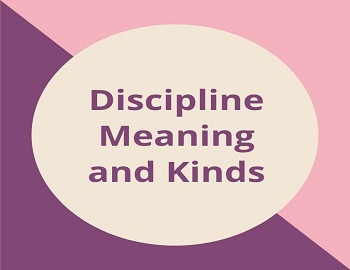Table of Contents
Discipline Meaning and Kinds:
According to F.C. Aggarwal, “Discipline is the lifeblood of a nation. It is the lifeblood of a school”.
Meaning and Importance of Discipline:
The term ‘Discipline’ is a controversial term. The word ‘discipline’ has been derived from the English word ‘Disciple’ which means ‘willing follower’. This term of discipline has got a vital significance in the field of education. It is the only foundation upon which the aims of education can stand. A disciplined man means a man having a disciplined mind, instincts and habits, etc. He is free but he does not go beyond limits. It is an internal capacity that motivates and inspires a person to act properly. The quality of discipline cannot be cultivated forcibly but the students should be given freedom and in that free flow, they must be handled in such a way as to be careful about their proceedings in manners and behaviours. Their actions must be checked but not harshly or rudely. Affection alone can change the attitude of adolescents. If you want to punish them and through punishment, if you want to make them disciplined, then this is not possible. Momentary change can take place but there will be no change in their habits.
It has rightly been remarked, “Discipline is the means whereby children are trained in orderliness, good conduct and the habit of getting the best out of themselves”.
Kinds of Discipline:
Various educators and thinkers have explained the term ‘discipline’ in two ways. In other words, there are two kinds of discipline i.e. external and internal.
External Discipline:
This discipline means some sort of external pose of a boy or girl who is disciplined. Outwardly he may be disciplined but what about his conscience or heart? We are not sure about this. This discipline is maintained through Rewards and Punishments. In the classroom, an adolescent is sitting calmly because he is afraid of his teacher and his caning. Such maintenance of discipline is a temporary phase. After leaving the class, the particular boy becomes as usual. To justify this fact we may put an example of military training. In this training, the trainees seem to be disciplined. They are arranged in such a way and the cautions are observed in such a manner that anybody can praise their obedience and discipline. But this attitude recedes back with the returning of the trainees to home. This discipline is termed as an external discipline.
Internal Discipline:
The present educators and thinkers are of the opinion that the external discipline is not the discipline in the true sense of the term. This type of discipline is not the discipline but fear or force of the teacher. The students may be disciplined and well mannered, but so far as their attitudes of behaviour are concerned, they are unchanged. Real discipline is the discipline of mind, heart, attitude and behaviour. In a nutshell, we may say that internal discipline is the real discipline. This is a heartfelt feeling. A child brings in the quality at his own will. Dewey favours social discipline. He is of the opinion that the atmosphere or environment of the school or college should be put of such a nature that the children may distinguish the desirable form from undesirable. For the maintenance of discipline, it is essential for a teacher to be disciplined and well mannered. He must have an affectionate heart and submissive feelings.
According to T. Percy Nunn, “Discipline consists in the submission of one’s impulses and power to regulation which is improved from above and brings efficiency and economy where there would otherwise be ineffectiveness and waste”.









Comments (No)